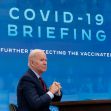Throughout the COVID-19 pandemic, each state has enacted its own unique laws on vaccines and testing requirements to mitigate the spread of COVID-19. While the Supreme Court has ruled in the past on two paramount cases that give the state the power to enforce vaccine mandates, it doesn’t create an obligation on a state to do so. It has begged the question of whether vaccine mandates are a constitutional issue, a violation of the Civil Rights Act, or purely a state versus federal government issue.
A Gallup poll taken in September 2021 showed that a majority of Americans support the vaccine mandate for private companies, yet politicians have split down party lines on their stances. As vaccines and testing become politicized, so do the mandates for each state.
In the state legislatures, the trend of partisan beliefs on vaccine mandates has largely translated into a mass variation of mandates across all fifty states. Court cases have popped up over the past months as Republican-led states generally oppose vaccine mandates. Two Iowa lawmakers, for example, have proposed a bill in their state legislature that would make it illegal to require a vaccine or even inquire of an employee’s vaccine status claiming that “if you lose autonomy of your body, you are no longer an employee, you are a slave.”
In California, the state has no requirement to show proof of vaccination, but the county of Los Angeles requires all individuals over the age of 12 to show proof of vaccination to enter a bar, gym, restaurant, or other indoor facilities.
The United States’ federalist system gives both the federal and state governments regulative authority when it comes to matters of public health. However, traditionally, this responsibility has fallen to the states' police powers to enforce mandates. This power stems from the Supreme Court’s ruling on two fundamental cases over vaccine mandates.
The first of these cases was in 1905, in the case of Jacobson vs. Massachusetts, where the state fined Mr. Jacobson for refusing a free smallpox vaccination. The Court ruled in favor of the state, claiming that states have the constitutional police power to create and implement vaccine laws to protect their citizens.
Then, in 1922, in Zucht v. King, the Court heard another case challenging the 1905 decision. In this case, the plaintiff challenged vaccine mandates for public and private schools as a violation of students’ 14th Amendment due process rights. Citing the earlier Jacobson vs. Massachusetts case, the Court ruled that it “is within the police power of a state to provide for compulsory vaccination,” therefore upholding the earlier decision.
But if states have the police power to enforce these mandates, how does this work with liberties guaranteed under the Civil Rights Act or state law guaranteeing religious and medical exemptions? In California, this exact debate is ensuing as an employee of Xeris Pharmaceuticals, Inc. is suing the company for alleged failure to accommodate based on a religious exemption claim to the COVID-19 vaccine. The company had previously granted Kelly R. Brenner a medical exemption with full accommodations to allow Mrs. Brenner to continue working. However, once the medical examination expired, Mrs. Brenner applied for a religious exemption, which was approved by the company but was not accompanied by the same accommodations as the medical exemption, putting Mrs. Brenner on unpaid leave until either she received the COVID-19 vaccine or the company lifted the mandate.
Mrs. Brenner argues that her “risk profile did not change” from when she was under a medical exemption to when she began to seek a religious exemption, and therefore the same accommodations” should have been granted. Mrs. Brener was previously granted a medical exemption because she had contracted COVID-19 too close to the deadline the company had put for all employees to receive their full vaccination.
Brenner brought these allegations against Xeris Pharmaceuticals, Inc., for violations of the California Fair Employment and Housing Act (FEHA), Brenner claimed the company “engaged in religious discrimination” when they “failed to provide Mrs. Brenner a reasonable accommodation” for their mandatory vaccination policy.
When the Vaccine Mandates first came out for federal workers under an Executive Order by the Biden Administration, many turned to religious and medical accommodations required under Title VII of the Civil Rights Act. However, the U.S. Equal Employment Opportunity Commission published a statement in May 2021 that “Federal EEO laws do not prevent an employer from requiring all employees physically entering the workplace to be vaccinated for COVID-19.”
While the Supreme Court has ruled twice that a state can enforce a vaccine mandate, the political sway of that state has become more indicative of whether a state, county, or city will actually do so or not.






